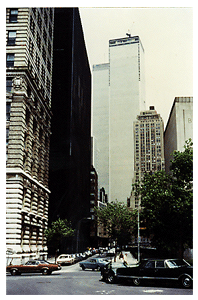

| The Pencil: A Reflection for Christmas 2004 Early in October, while reading the excellent book, Compassion: A Reflection on the Christian Life, I came across a passage which grabbed my attention: "...compassion can at most be a small and subservient part of our competitive existence. This sobering idea was forcefully brought home to us during the early stages of this book. One day, the three of us visited the late Senator Hubert Humphrey to ask him about compassion in politics. We had come because we felt he was one of the most caring human beings in the political arena. The Senator, who had just finished talking with the ambassador of Bangladesh, and obviously expected a complaint, a demand, or a compliment, was visibly caught off guard when asked how he felt about compassion in politics. Instinctively, he left his large mahogany desk, over which hung the emblem reminding visitors that they were speaking with the former Vice-President of the United States, and joined us around a small coffee table. But then, after having adapted himself to the somewhat unusual situation, Senator Humphrey walked back to his desk, picked up a long pencil with a small eraser at its end, and said in his famous high-pitched voice, "Gentlemen, look at this pencil. Just as the eraser is only a very small part of this pencil and is used only when you make a mistake, so compassion is only called upon when things get out of hand. The main part of life is competition, only the eraser is compassion. It is sad to say, gentlemen, but in politics compassion is just part of the competition...." I had two thoughts after reading this passage: 1) Here was a public person, well known for his compassion in public policy, relegating compassion in politics to the subordinate status of eraser. 2) I also was aware that an eraser, unused, soon hardens and becomes useless. Is this the same with unused human compassion? Ours has become a brutally competitive society: winner take all, Losers are...losers. Compassion is, more than ever, only the eraser; its use determined by the Winner. We have experienced, once again, the brutal polarity of U.S. elections. Once again the electoral "Super Bowl" has identified winners and losers. Once again, the U.S. population is described as split. I wonder: who qualifies for compassion? What does a 'winner' - and society at large - lose, in a winner-take-all society as ours has become? What is the cost of this polarity to the United States? To the world at large? Does a person deserve compassion as a right? Or does he or she have to qualify for it, or earn it? Do we each set up a 'compassion boundary', which we restrict to only certain people: family, certain friends, neighborhood, town, state, nation? Or does everyone in the world - an Iraqi? an Afghani? Someone in Darfur or Haiti? - equally merit compassion whether we know them or not? These are questions, I think, worthy of serious reflection and action. All the Blessings of Christmas, and a Happy New Year to All, Everywhere. The quotation above is from the book Compassion: A Reflection on the Christian Life by Henri J.M.Nouwen, Donald P. McNeill, Douglas A. Morrison. Image Books/Doubleday c 1966, 1983 pages 5&6. Need Ideas for a holiday gift to others and yourself? You know there are thousands. Choose some specific 'targets' for compassion: two ideas of ways to help the desperately poor of Haiti are at www.chez-nous.net/peace_haiti.html. A book which helps define an exciting and truly constructive ways to help third world poor achieve justice while challenging our stereotypes about the poor is The Miracles of Barefoot Capitalism by Jim Klobuchar and Susan Cornell Wilkes. While not mentioned in the book, Haiti's Fonkoze bank www.fonkoze.org is truly one of those Miracles. The book can be accessed through www.jimklobuchar.com/micro.html. An excellent twin cities social justice agency is St. Stephen's Human Services, Minneapolis www.ststephensmpls.org "working to end homelessness through effective programs, partnerships, and advocacy." | ||||||||||||||||||||||||||||||||||||||||||||||||||||||||||||||||||||||||||||||||||||||||||||

